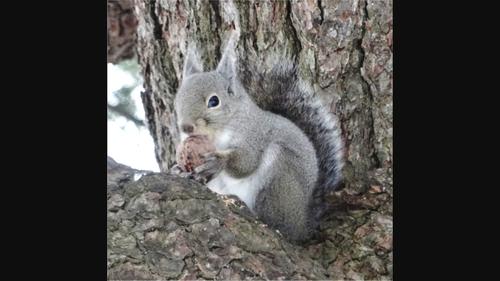当前位置:
X-MOL 学术
›
Ecol. Res.
›
论文详情
Our official English website, www.x-mol.net, welcomes your feedback! (Note: you will need to create a separate account there.)
Heritability of walnut seed size and the benefits of large seeds
Ecological Research ( IF 2 ) Pub Date : 2024-04-03 , DOI: 10.1111/1440-1703.12464 Noriko Tamura 1
Ecological Research ( IF 2 ) Pub Date : 2024-04-03 , DOI: 10.1111/1440-1703.12464 Noriko Tamura 1
Affiliation

|
Japanese walnuts (Juglans mandshurica ) are known to be seed‐dispersed by the hoarding of two species of rodents, Japanese squirrels (Sciurus lis ) and large Japanese field mice (Apodemus speciosus ). The previous study showed that the squirrel transported and stored larger walnut seeds farther, whereas the mice transported smaller seeds farther. Divergent selection by different seed dispersers may play an important role in differentiation between local walnut populations, in which understanding seed size heritability is crucial. This study aims to determine how the seed size selected by rodents affects the initial growth of walnuts and to what extent walnut seed size is genetically determined. Sixty walnut seeds were collected from a small seed‐producing tree, and 50 walnut seeds from a large seed‐producing tree were sown and grown for 18 years. The seed size produced from each tree showed that the heritability of seed size was high (h 2
中文翻译:

核桃种子大小的遗传力和大种子的好处
日本核桃(核桃 )已知通过囤积两种啮齿动物日本松鼠(松鼠 )和大型日本田鼠(黑线姬鼠 )。先前的研究表明,松鼠将较大的核桃种子运输和储存得更远,而老鼠则将较小的种子运输和储存得更远。不同种子传播者的不同选择可能在当地核桃种群之间的分化中发挥重要作用,其中了解种子大小的遗传力至关重要。本研究旨在确定啮齿动物选择的种子大小如何影响核桃的初始生长以及核桃种子大小在多大程度上是由基因决定的。从一棵小结籽树上采集了 60 颗核桃种子,从一棵大结籽树上采集了 50 粒核桃种子,播种并生长了 18 年。从每棵树产生的种子大小来看,种子大小的遗传力较高(H 2
更新日期:2024-04-03
中文翻译:

核桃种子大小的遗传力和大种子的好处
日本核桃(



























 京公网安备 11010802027423号
京公网安备 11010802027423号